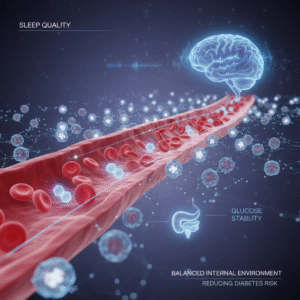Understand insomnia’s impact, causes, and proven treatments. Learn about sleep hygiene, CBT-I, and when to seek professional help for better sleep.
What Is Insomnia?
Insomnia is one of the most common sleep disorders affecting people today, yet it is often misunderstood or minimized. While everyone experiences the occasional sleepless night, true insomnia is defined as a persistent difficulty falling asleep, staying asleep, or waking up too early and being unable to return to sleep. This condition goes beyond a restless night or two; it has a real and measurable impact on daily life.
Insomnia disrupts your ability to function during the day, leading to fatigue, poor concentration, irritability, and even increased risk for mental and physical health issues. According to estimates, 30-35% of adults experience insomnia symptoms, with 10-20% suffering from chronic insomnia that severely affects their quality of life.
Insomnia Awareness Day, observed every March 11th, reminds us of the importance of recognizing sleep problems and taking meaningful steps toward recovery.
How Common Is Insomnia?
Insomnia can affect anyone — from high-performing professionals to new parents, from students to retirees. However, it does show up more frequently in some groups:
- Women are nearly twice as likely as men to experience insomnia due to hormonal shifts, pregnancy, menopause, and increased susceptibility to anxiety.
- Older adults often face insomnia due to changes in sleep architecture and the presence of chronic health conditions.
- People with mental health disorders, especially anxiety or depression, are at significantly higher risk.
Chronic insomnia is officially diagnosed when symptoms occur at least three nights per week for three months or longer.
Types of Insomnia
Understanding the type of insomnia you are dealing with is essential to finding the right treatment. Insomnia generally falls into two main categories:
1. Acute Insomnia
- Duration: Days to a few weeks
- Common Triggers: Stress from exams, job loss, grief, or travel-related time zone shifts
- Treatment: Often resolves without medical intervention but may benefit from short-term behavioral adjustments
2. Chronic Insomnia
- Duration: At least three nights per week for three months or more
- Common Causes: Underlying health issues, chronic stress, poor sleep hygiene, medications, or psychological conditions
- Treatment: Typically requires a multi-faceted approach, including behavioral therapy, lifestyle changes, and sometimes medication
Other subtypes include:
- Onset Insomnia: Trouble falling asleep at the beginning of the night
- Maintenance Insomnia: Frequent awakenings or trouble staying asleep
- Terminal Insomnia: Waking up too early and being unable to return to sleep

What Causes Insomnia?
Insomnia can arise from a wide variety of factors. Some people may experience more than one cause at once:
Psychological Causes:
- Stress: Worrying about work, family, or health can cause your brain to stay active at night.
- Anxiety and Depression: Both can disrupt sleep cycles and make it difficult to relax.
Medical Conditions:
- Chronic Pain: Conditions like arthritis or fibromyalgia make it hard to get comfortable.
- Restless Legs Syndrome (RLS): An uncontrollable urge to move your legs can interrupt rest.
- Sleep Apnea: Interrupted breathing disrupts deep sleep phases and often coexists with insomnia.
Medications and Substances:
- Stimulants: Caffeine, nicotine, and certain medications can delay sleep onset.
- Antidepressants or steroids: Some prescriptions unintentionally interfere with sleep.
- Alcohol: While it may make you drowsy at first, it often leads to fragmented sleep.
Environmental and Behavioral Factors:
- Noise or light exposure
- Irregular sleep schedules
- Excessive screen time before bed
- Shift work or frequent travel across time zones
The Impact of Insomnia on Daily Life
Insomnia isn’t just about being tired. It can have far-reaching consequences that influence all areas of life.
- Cognitive impairments: Difficulty concentrating, slower reaction time, poor decision-making
- Emotional instability: Increased risk of depression, irritability, mood swings
- Weakened immune function: Higher susceptibility to illness
- Increased risk of chronic diseases: Heart disease, diabetes, and hypertension
- Lower quality of life: Reduced productivity, strained relationships, and social withdrawal
Over time, insomnia can become a self-reinforcing cycle. The anxiety about not sleeping becomes its own barrier to sleep, creating a loop that feels impossible to break without help.

Evidence-Based Treatments for Insomnia
The good news is: insomnia is treatable. Many people find relief with the right combination of strategies. Let’s explore the most effective options:
1. Cognitive Behavioral Therapy for Insomnia (CBT-I)
This gold-standard treatment helps rewire your brain’s associations with sleep. It includes:
- Stimulus control therapy: Rebuilding the association between bed and sleep
- Sleep restriction: Reducing time in bed to improve sleep efficiency
- Cognitive restructuring: Challenging irrational thoughts about sleep
- Relaxation techniques: Breathing exercises, progressive muscle relaxation, and mindfulness
CBT-I can be done with a therapist or through digital programs and has been shown to be more effective than sleeping pills in the long term.
2. Sleep Hygiene Improvements
Often the first step in treatment, sleep hygiene includes:
- Keeping a consistent sleep-wake schedule
- Reducing caffeine and alcohol intake, especially in the evening
- Avoiding naps late in the day
- Keeping the bedroom cool, dark, and quiet
- Limiting screen time one hour before bed
Creating a relaxing bedtime routine
3. Medications (Short-Term Use)
Doctors may prescribe sleep aids for acute insomnia or severe symptoms:
- Prescription sedatives: Like zolpidem (Ambien) or eszopiclone (Lunesta)
- Over-the-counter aids: Melatonin or antihistamines (diphenhydramine)
These should only be used temporarily and under medical supervision due to the risk of dependency and side effects.
4. Lifestyle and Behavioral Changes
- Regular physical activity: Preferably not close to bedtime
- Stress reduction: Journaling, therapy, meditation
- Limiting evening stimulation: Avoid heavy meals or emotional conversations before bed
When to See a Sleep Specialist
If insomnia persists despite self-help efforts, it’s time to seek professional guidance. A sleep specialist may:
- Conduct a sleep study (polysomnography)
- Evaluate for coexisting sleep disorders
- Recommend customized CBT-I plans or medication management
Don’t wait until sleep loss severely affects your health or life. Chronic insomnia is not just a nuisance — it’s a medical condition that deserves attention.
Conclusion
Insomnia affects millions, but you don’t have to suffer in silence. Whether you’re struggling to fall asleep, stay asleep, or wake too early, the right tools and treatments can help you reclaim your rest.
Start by improving your sleep hygiene and examining lifestyle factors. If needed, seek professional treatment like CBT-I, which offers long-lasting relief for most sufferers. Sleep is foundational to health, mood, and quality of life. Treat it with the importance it deserves.
Frequently Asked Questions
What is considered chronic insomnia?
Chronic insomnia occurs when symptoms persist at least three nights per week for three months or more. It often requires behavioral therapy and sometimes medication to manage effectively.
Can I cure insomnia naturally?
In many cases, yes. Improving sleep hygiene, managing stress, and trying CBT-I techniques can significantly reduce or eliminate insomnia symptoms without medication.








